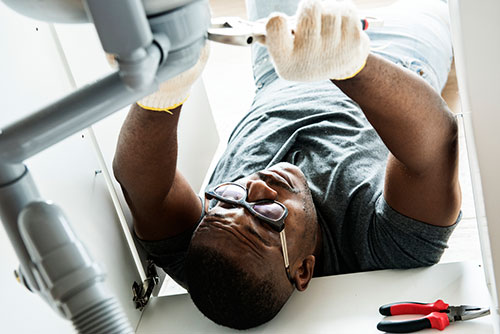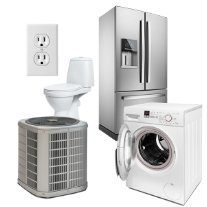By treating your home’s plumbing system the way a plumber would, you can avoid costly repairs and replacements. From what can go down the garbage disposal to the best way to unclog pipes, here are eight things plumbers wish homeowners knew.
Grease is no good
While it’s tempting to pour cooking grease down the drain for easy disposal, plumbing professionals will emphatically tell you “don’t do it!” Grease, oil and fatty substances coagulate as they cool, which means they can solidify in your pipes. Those globs of grease can clog and back up your plumbing.
A garbage disposal is not a trash can
Similarly, experts warn that tossing food scraps and other debris down the disposal can do a lot of harm to your plumbing system. Garbage disposals can’t handle piles of potato peels or the leftovers from your plate, even if you grind them to bits. Instead compost those food scraps and use the garbage disposal sparingly. When you do use it, make sure to run the disposal long enough to grind food down and flush the drain with lots of water.
Toilets are not for trash either
While the toilet is designed for one of the dirtiest jobs in the house, it can need some TLC and should only take on things that are ok to flush. No feminine hygiene products, paper towels, cotton swabs or cat litter clumps; flushing those away could mean clogged pipes.
Steve Reckon, owner of Reckon Plumbing in Southern California, also advised against drop-in toilet bowl fresheners. The tablets, he said, often contain chemicals that wear out working parts inside the tank and that the tablets could get stuck in the flush valve when they break apart.
Treat old pipes with care
Clogs are irritating, we know. But don’t let clearing them lead to bigger problems down the road. Caustic, oxidizing chemicals found in conventional drain cleaners can cause corrosion and leaks in old pipes. Instead, they advise reaching for a natural drain cleaner that clears clogs with enzymatic action. Such cleaners might not work as quickly as harsher chemicals, but they will help protect your pipes in the long run.
Take care of your water heater
It’s recommended to flush your water heater every year to remove lime and other deposits. The mineral buildup could impede proper functioning over time. The average water heater tank lifespan is eight to 12 years – prioritize annual maintenance to get the most longevity out of your water heater and avoid costly repairs.
Guard against leaks
Spending a few hundred dollars on a leak protection system with an alarm and a main water shutoff is a wise investment that could save much more money in the long run.
If your water bill is much higher than usual it can be a warning sign of a leak. The easiest way to check for leaks is to turn off all faucets and any appliances that use water, like your dishwasher. Then, go to the water meter and watch — if the meter is moving, there’s water flowing somewhere in the house, which means there’s a leak. Shut off the water and call the plumber.
Keep an eye out for water around the base of the toilet, which can mean the wax ring seal is failing. Even small amounts of water can damage the floor and replacing the seal as soon as you notice the issue will spare you a headache down the road.
Don’t forget the hoses
Replacing rubber hoses for washing machines and dishwashers every five years can save you from the flood that can come when a hose bursts. When you do replace the rubber hoses, use stainless steel whenever possible.
Know when not to DIY
The best piece of advice plumbers have for homeowners is to know your limits and not take on a complicated project that is beyond your skill set. Instead, call a professional to save yourself hassle and money.
2-10 HBW offers the most comprehensive Home Warranty coverage for homeowners. Let us help you protect your home.








